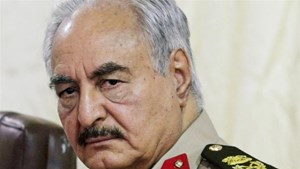Libyan general to end oil blockade, adding more barrels to a glutted market
(Bloomberg) - The blockade on Libyan oil exports imposed by one faction in the country’s civil war will be lifted, potentially adding large volumes of crude into a weak market if other parties in the conflict accept the move.
General Khalifa Haftar said on television that he has decided to allow the reopening of Libya’s oil ports “as per conditions and guarantees that ensure a fair distribution of wealth and spare it being plundered or used in terrorism financing.”
It’s unclear how much of the 1.1 million barrels a day Libya was pumping prior to the blockade can return to the market, or how quickly. The Tripoli-based Government of National Accord wants production to resume immediately, according to a copy of the agreement with Haftar’s forces seen by Bloomberg.
However, Libya’s National Oil Co. has previously denounced the “secretive” talks that led to Haftar’s offer and has said it won’t resume exports until foreign mercenaries leave the country. A spokesman for the NOC declined to comment on Friday.
Oil erased gains, with Brent crude dropping 1.1% to $42.84 a barrel as of 1:10 p.m. in London.
There have been false dawns before in efforts to resolve the long-running conflict between forces loyal to Haftar, who control eastern Libya, and the government based in Tripoli. Parameters of the deal announced on Friday were unclear.
Haftar had conditioned resuming production on a mechanism being in place to distribute revenue, officials said. The NOC, backed by the U.S. and United Nations, had proposed freezing revenue until that mechanism is decided, and also conditioned lifting the export shutdown on the withdrawal of Wagner, a Russian mercenary force, and other armed groups.
Any additional supplies would be entering the market at an unfortunate time, just as the recovery from the historic slump triggered by the Covid-19 pandemic is faltering. Brent crude, the international benchmark, fell below $40 a barrel last week for the first time since June, prompting a robust response from OPEC+ at a meeting on Thursday.



